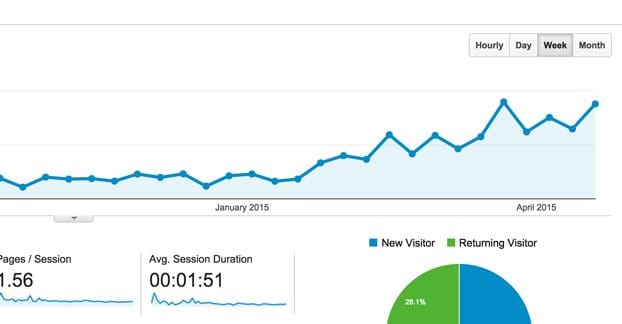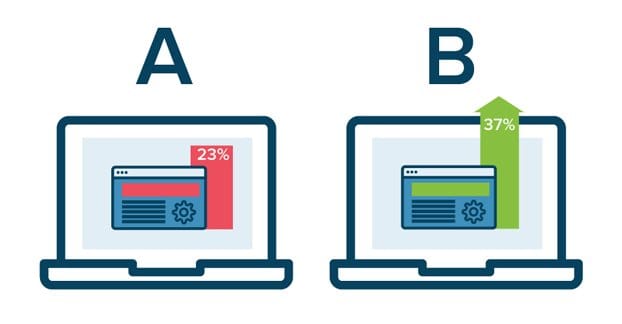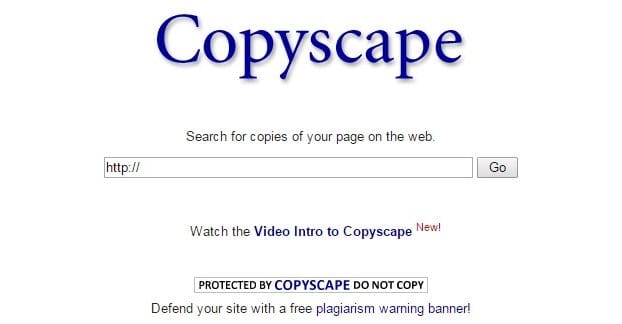I’m going to cover this topic from both angles, so strap in folks, we have a lot to cover. If you’re the one guest posting on other sites, and the site you’re targeting is small, is it worthwhile? And, if you’re publishing guest posts, is it worth it to publish something from a small site?
Publishing Content on a Small Site
First of all, let’s talk about publishing your content on a smaller site. Or, rather, let’s talk about the difference between a smaller site and a larger site.
A smaller site is, obviously, smaller. This means they have a smaller audience, though that audience may be quite engaged if they’ve done a good job of hooking the right kinds of people with the right kinds of content. The smaller site is not likely to refer as much traffic as a larger site would. Of course, as we all know, guest posting is not necessarily going to earn you much traffic, even if you publish it on a huge site that’s the top of your industry. Most of the benefits of guest blogging come from other channels.
A smaller site is a lot more likely to be interested in publishing your content. Think about it; when you’re small, any amount of attention from anyone larger than you is hugely beneficial. That person can refer traffic, can promote you on their social media feeds, and can bring you a lot of benefit. It’s like legitimizing your site in the eyes of your peers and betters. From the smaller site’s perspective, it’s a huge boon to publish content from someone who wouldn’t normally even give their site a second glance.
A smaller site is also more likely to allow a followed link. Large sites know they’re often exploited due to the immense power of a link from a high profile site. Thus, virtually every link they publish is nofollowed, so it doesn’t give SEO benefit to anyone. There’s evidence to suggest that a non-linked brand mention can be valuable as well in pure Google algorithm terms, but the link is still the king.
Most smaller sites are willing to accept these in the hopes that they can get a link in return, and in part simply because they don’t have to worry quite as much about it. They can always go nofollow links later, if they think the existence of followed links is somehow hurting their SEO. Earlier on, they can use followed links as endorsements for larger brands, and it gives them a bit of leverage to encourage other larger brands to post on their site as well. In other words, they get to use one of their small advantages over large sites to try to grow.
Speaking of growth, smaller sites can grow into larger sites. You never know what site might become the next Facebook or Twitter, the next Forbes or TechCrunch or Mashable. Buzzfeed started out life as a clickbait shop and has become an internet powerhouse. Google doesn’t really care about how large a site was when a link was published. Getting your links in early puts your foot in the door for a profitable relationship should that small site explode into something powerful.
And hey, it does you no good to ignore the little guy. If they’re in your niche, that respectful guest post could mean the difference between them directly targeting you to poach your customers, and them working with you for mutual benefit. They’ll remember you if you helped them out when they were small, and they may be able to repay the favor.
Small sites might also be open to repeat content contributions. In fact, small sites are an incredible good – for lack of a better term – dumping ground for content. When you’re growing your own site, you might have topics that interest you but don’t interest your audience. Writing posts about those topics won’t do much good for your site directly, but they might be great for a smaller site to publish. It gives you a way to write about content that interests you and still publish that content in a way that can benefit your site along the way.
Smaller sites are also more likely to genuinely recommend your company and product later, and that can turn into a powerful endorsement. When you offer to create content for their site, they’ll check you out. If you happen to have a product they might like to use, they might be interested in becoming a customer. You can further sweeten the deal by offering them a discount or an introductory offer if they express interest. This leads the way to a genuine testimonial, a good review, a recommendation to their audience, or even an affiliate partnership if you’re willing to pay them for their referrals. Plus, since a smaller site has less incentive to lie for the traffic or for the money, their opinions are more likely to be genuine.
From a purely practical standpoint as well, it’s just easier to post on a small site. Unlike large sites, they aren’t likely to want to charge for the privilege. They’re more accepting of content since they don’t have as many pitches to go through, and their quality standards are likely quite a bit lower than a site like Forbes.
So, there can be a lot of benefit to publishing your content on a smaller site. Now let’s flip the question on its head. What if a smaller site approaches you to ask to guest post on your site?
Publishing Content From a Small Site
To start out, a small site obviously has a keen interest in publishing content on sites larger than them. That’s the position everyone is for guest posting, right? You want to publish content on a site that is better than yours, so that you can reap the value of their link, their traffic, their exposure, and their audience. I like writing for sites like Entrepreneur because it leads to new subscribers almost every time. So why would Entrepreneur like me?
Publishing from a smaller site makes them appreciative of your site. They’re grateful that you gave them the opportunity to get a share of your audience’s attention, and they can pay you back with organic links, recommendations, and even converting into customers themselves, depending on what your overall product happens to be.
This only applies to sites up to a certain size, of course. I doubt Forbes would decide to use my service if I published content with them, but then again, you never know. Maybe a specific editor or writer has their own site that would benefit, and I could earn a customer that way. Regardless, when you’re the host of the content, the author of the content will look at what you do and might decide it’s something they want to use.
Publishing from a smaller site gives you the opportunity to publish content from a perspective or covering a topic you wouldn’t normally cover. If you have a firmly established author persona, it can be hard to break from that persona without losing the loyalty of your audience. You can’t necessarily publish controversial opinions or topics that stray outside your area of expertise. Publishing content from another author allows you to have that kind of content on your site without jeopardizing your voice.
To an extent, you can use it to experiment as well. Publish content about a topic that’s a bit tertiary to your normal line of business, and see if it attracts engagement or traffic. If it turns out to be successful, it can lead you towards a new way to expand your business.
Publishing content from a smaller site gives you content for your editorial calendar you didn’t need to produce yourself. If you’ve been running a small site with a frequent publication schedule, you know how difficult it is to fill up all of those slots. I used to write and publish seven articles per week, one per day, across several blogs. That was a hell of a lot of work, and frankly it wasn’t as worthwhile as a slower schedule with longer, more detailed posts. Even now, it’s difficult to come up with content for some of my sites that hasn’t already been covered. Publishing content from a guest poster can give you a much-needed respite from the constant pressure of coming up with content.
As with the reverse, a smaller site always has the potential to grow and perhaps surpass you. If you have a hand in their growth, they’re a lot more likely to want to return the favor on down the road. They might not necessarily be able to, of course, but that’s the way you play the game. Network with anyone and everyone you can, so you have those relationships ready to go if you find an opportunity later.
You may have the opportunity to charge for a guest post slot, if you do it wisely. You aren’t always able to charge for publishing on your site, and in fact some writers won’t even consider a free post; they want to be paid. However, in some scenarios you can earn a bit of cash on the side. Just remember that Google doesn’t like this, so if you make it too public or do it too frequently, you can eat a penalty.
Earning a reputation for publishing content makes more people more likely to want to do so, giving you your pick of the cream of the crop to publish. A lot of the people submitting content to you are, frankly, going to be crap. Their content sucks, their sites suck, and their pitches suck. It’s the price you pay for publishing content from other people. Hell, it’s the price you pay for running a blog. Even if you don’t publish guest posts, you’ll get pitches from gray and black hat marketers who just scrape WhoIs data and send out mass mailers to any email they find.
The more you publish, and the more prominent and more valuable your guest post positions become, the more people will want to pitch to you. Eventually, you’ll be able to publish as much as you like without compromising on the quality.
A Caution About Publication
When you’re opening your site up to content produced by someone else, you need to be very careful about how you do it. Remember, even if you didn’t write the content, it’s still published on your site, so it’s still your responsibility to vet. If the original author is using exploitative tactics, it can hurt your site more than theirs.
Always make sure the originating site is something you wouldn’t mind associating with. If they’re a spam site, a thin affiliate, or they sell products you don’t support, don’t publish their content.
Always make sure the content itself is original. Run it through something like Copyscape to make sure it wasn’t scraped, and give it a thorough read-through to make sure it wasn’t just spun from something popular. Often times, you can identify spun content by some idiosyncrasies with the writing.
Make sure that you’re maintaining control and copyright over the content you publish. You want to be able to edit it and fact-check it to make sure you’re not publishing misinformation. You also want to be able to maintain control over links, to edit or remove them later if need be. By maintaining publication rights, you won’t get into a situation where an author gets miffed at you and decides to pull their content.
Just be careful. It’s your site, after all. You don’t want to jeopardize your growth or your business just because you’re too lazy to write a post for a week. Treat guest posting like a business relationship, not a favor, and you should be fine.
 ContentPowered.com
ContentPowered.com







